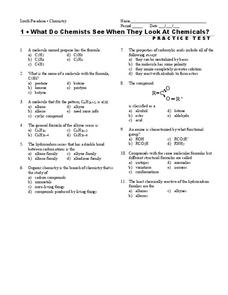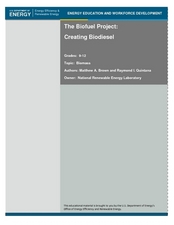Curated OER
What do Chemists See When they Look at Chemicals?
In this chemicals worksheet, students answer 15 multiple choice questions about chemicals, compounds, inorganic and organic molecules.
Curated OER
Ionic Compounds
In this compounds worksheet, students review the structure and properties of ionic compounds, their formulas and nomenclature, and molecular mass and percentage composition. This worksheet has 4 short answer questions and 7 problems to...
Curated OER
Quick Breads: A Practical Application
Apply food selection and preparation guidelines related to quick breads, rice, grains, and pasta. National Standard 14.3.3 Identify basic cooking techniques related rice, grains, and pasta Identify examples of quick breads: muffins,...
Curated OER
The Effects of Temperature on Chemical Mixtures
Students explore chemical cahnges and the effect of temperature on chemical mixturees, They make observations of the behavior and appearance of certain chemical mixtures and reactions.
Curated OER
Speeding up the Fizz
Students investigate temperature and chemical reactions. They explore the effect of temperature and particle size has on the rate of a simple chemical reaction. In addition, they graph their results and answer assessment questions.
Curated OER
The Periodic Table
In this science worksheet, students use a periodic table to complete the first four rows of a chart. Students use the Internet or research books to complete the last column.
Curated OER
Chemistry of Food
In this chemistry of food worksheet, students complete 20 various types of questions related to food and nutrition. First, they complete a crossword puzzle with vocabulary terms. Then, students use the figure shown to write the...
Curated OER
The Structure of DNA
In this structure of DNA worksheet, students answer several short answer questions applying knowledge about the structure of DNA. Students also match the description to the correct terms.
Curated OER
Water - the (Nearly) Universal Solvent
In this water worksheet, high schoolers explore the reasons why water is considered a universal solvent. Students compare different ways to change the dissolving rate of a solute. This worksheet has 11 fill in the blank and 8 matching...
Curated OER
More Names and Formulas!
In this compounds worksheet, students write the correct name or the correct formula for the given compounds. Students complete 20 problems.
Curated OER
The Bio-fuel Project: Creating Bio-diesel
Students investigate bio-fuel. In this investigative lesson, students create bio-fuel from vegetable oil waste. Students will analyze, predict, collect and synthesize data from their experiments with bio-fuel.
Curated OER
Batteries
In this battery worksheet, students answer 14 questions about primary cell batteries, secondary cell batteries, and how batteries are charged. They calculate the rates of discharge for given batteries.
Curated OER
Solutions and Suspensions
Learners explore matter by conducting an in class demonstration. In this liquid mixture lesson, students identify the difference between a solution in which a solid dissolves into liquid, and a suspension where the solid doesn't dissolve...
Curated OER
Molecular Modeling Activity
High schoolers explore the concept of molecular modeling and differentiate between saturated and unsaturated compounds. In small groups, they identify molecular formulas, complete a chart comparing alkanes, alkenes, and alkynes, and...
Curated OER
Naming Binary Covalent Compounds
In this compounds instructional activity, students read how to name binary covalent compounds and then practice by naming 10 binary covalent compounds.
Curated OER
COMPARISON OF FOUR-, SIX-, AND EIGHT-bp CUTS IN CALF THYMUS DNA
Students use this laboratory exercise, restriction enzymes to recognize a four-, six-, and eight-nucleotide sequence. Assuming that the four component nucleotides (A, C, T, G) are distributed randomly within a DNA molecule, then any...
Curated OER
DNA: What Does It Mean?
Tenth graders explore DNA using online tutorial. They perform their own DNA extraction from a clove of garlic and identify the key components of DNA.
Curated OER
Activity #13 Changing The Look of Sugar
Students observe what happens when sugar is dissolved in water and when it is heated. They weigh the products after each of the two experiments on a balance scale. Pupils distinguish between physical and chemical changes. Students are...
Curated OER
Molecular Polarity
In this science worksheet, students solve problems that are related to the concept of molecular polarity. The answers to the problems are included.
Curated OER
Nucleic Acid
In this chromosome activity students complete a crossword puzzle by answering questions on DNA, nucleic acids, nucleotides and RNA.
Curated OER
A Helthy Diet
Pupils examine their eating habits and experience analyzing data and drawing conclusions. They construct models of the molecular backbone of saturated and unsaturated fats. In addition, they examine the labels of their food, record the...
Curated OER
Bouncing Balls
Students create a polymer ball in the lab. In this chemistry lesson, students identify the different properties of the polymer they created. They explain what type of chemical reaction took place.
Curated OER
EGG-cellent POLYMER PACKAGING DESIGN
Students investigate the concept of a polymer using an experimental design of protecting an egg in a bookbag. They test the properties of polymers and form an educated solution to the proposed problem. Then they describe the steps used...
Curated OER
Genetics DNA Replication
Young scholars explore DNA replication. Beginning with a teacher led discussion, students examine inherited information, genes, and Deoxyribose Nucleic Acid (DNA). As the teacher models the structures of DNA, tells about the...

























